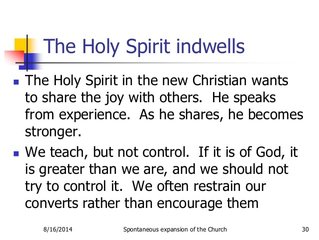 Remember from a few days ago that the subtitle of this book is, “And the Causes Which Hinder It”. It only took a short paragraph in the Introduction for Allen to get to this point, but expands it in much detail later. Here is his initial list of hindrances
“The years that have passed since that early experience, and careful examination of our missionary work in other lands have confirmed the impression [above]. I find that many of our missionaries are inclining to take the same view, and often welcome being reminded. Many are beginning to perceive that we cannot establish a foreign church governed and directed by foreigners, and then at some moment say: "Let us make it indigenous or native by process of down grading." If the church is to be indigenous it must spring up in the soil from the very first seeds planted. One or two little groups of Christians organized as churches, with their leaders, could spread all over an empire. They would be obviously and without question “Native Churches”. If we establish “missions or mission stations” rather than “churches”, two evil consequences occur. Sterility and antagonism. In other words, they are unable to reproduce themselves and they develop opposition toward those who planted in the first place.” Roland Allen, Edited by Sherman Driver
0 Comments
 ‘In this Chapter I relate briefly how I came to my present position, and state broadly the danger which I see, and the remedy. I then explain a difficulty in writing the book and set out in a few words its plan and purpose. Many years ago my experience in China taught me that if our object was to establish in that country a church which might spread over the six provinces of North China, that object could only be attained if the first Christians who were converted by our labors, understood clearly that they could by themselves, without any further assistance from us, not only convert their neighbors, but establish churches. That meant that the very first groups of converts must be so fully equipped with all spiritual authority, they could multiply themselves without any reference to us. Even while we were there, they might regard us as helpful advisers, yet our removal should not at all mutilate the completeness of the church, or deprive it of anything necessary for its unlimited expansion. Only in such a way did it seem to me to be possible for churches to grow rapidly over wide areas.’ Notice the key principles:
 For your free electronic copy go to www.NewFoundationsInternational.org and click on TRAINING RESOURCES at the top of page and scroll to bottom and click on The Spontaneous Expansion of the Church. For your free electronic copy go to www.NewFoundationsInternational.org and click on TRAINING RESOURCES at the top of page and scroll to bottom and click on The Spontaneous Expansion of the Church. Though this blog tends to address many issues that relate to church planting and development of leaders, I want to spend some weeks summarizing a book that has had a radical impact on missions. Roland Allen wrote, The Spontaneous Expansion of the Church and the Causes Which Hinder It, a treatise on missions that has revolutionized the thinking of many who are serious about its progress and at the same time evoked the ire of most in this field. I trust you will be one of those who is challenged and will follow with us through this series. I start by a quote and definition from Roland Allen on the term “Spontaneous Expansion”. ‘What do I mean by “spontaneous expansion”? I mean the expansion which follows activity of individual members of the Church explaining to others the Gospel which they have found for themselves. It is the expansion which follows the irresistible attraction of the Christian Church for men and women who see its ordered life, and are drawn to it by desire to discover the secret of a life which they instinctively desire to share with others. I mean also the expansion of the Church by the addition (planting) of new churches.’ Roland Allen, The Spontaneous Expansion of the Church: And the Causes Which Hinder It, American ed. (Grand Rapids, MI: Wm. B. Eerdmans Publishing Company, 1962), page 7. Quotations that I give will be more of a ‘paraphrase’ than a direct quote for readability and understanding.  There are many who come to me and ask the question, ‘how can I forgive so-and-so when they have done ______ to me’? Down through the halls of history, many have faced this struggle, even mature Christians. Even today, I read of a persecuted believer who watched her loved ones and fellow Christians die at the hand of their oppressors. Yet she says “I must forgive for the sake of Jesus my Savior”! How can this be done? Paul was very familiar with suffering because he was hated for proclaiming the gospel wherever he went. In 2 Corinthian 11:23-29 he listed the unbelievable suffering he endured during his ministry. In the face of this, he outlines over and over the Christ-like character that we as Christ-followers must model; specifically as to forgiving others, “forgive each other as the Lord has forgiven you, so you also must forgive” (Colossians 3:13). This ability to forgive is not generated in ourselves, but in looking at what Christ has done for us in His cross. We then are given the power of grace to forgive others regardless of what they have done. Unforgiveness breeds the infectious venom of bitterness. God’s forgiveness toward me multiplies the grace I need to forgive others. If you are struggling to forgive someone who has hurt you in some way, it is time to reflect on the cost of your forgiveness from God in Christ  Think of what a speck of sand can reveal. If the sand gets in the human eye, it causes irritation, then infection, and eventually loss of vision if not cared for. But put that same speck of sand in an oyster. It causes irritation, then secretion, and eventually the oyster works to form a pearl. The sand was an agent that revealed the inner properties of the eye and of the oyster. In a real sense, when we face an irritation in our lives, or marriages or families, or in ministry, you can let it develop into an infection or you can allow it to become a pearl. James hints at this same process. “Count it all joy, my brothers, when you meet trials of various kinds, for you know that the testing of your faith produces steadfastness. And let steadfastness have its full effect, that you may be perfect and complete, lacking in nothing” (James 1:2–4). Let me focus on one word; “Count”. This means to “govern or guide” the outcome of a situation. Often we have a very earthly view of trials and all we can see is inconvenience or discomfort. The proper remedy for sand in the eye is to wash it out with water or eye solution, therefore removing the cause of infection. Jesus offered the church in Laodicea “salve to anoint your eyes, so that you may see” (Revelation 3:18). Fellowship with the Lord will immediately reduce the irritation and recover spiritual eyesight. The oyster chooses to produce a fluid that will create something very valuable. We also have a choice when faced with trials in relationships and in ministry. Will we work to produce a priceless reflection of Christ? It will take time, but if we are consistent in the application of grace, a pearl will emerge.  As Tim and I met this morning to review some details of this ministry, our conversation turned to areas where we had seen God work most. There are certain distinct marks of His working that I want to review briefly here:
Mission Frontiers, Jan-Feb 2017, Page 5.  “I am no longer anxious about anything, as I realize that He is able to carry out His will for me. It does not matter where He places me, or how. That is for Him to consider, not me, for in the easiest positions He will give me grace, and in the most difficult ones His grace is sufficient.” Hudson Taylor (Missionary to China) “Not that I am speaking of being in need, for I have learned in whatever situation I am to be content” (Philippians 4:11), (Apostle Paul, missionary to the Gentiles). These are lessons that need to be learned in our day if our lives and ministries are going to be Spirit led. I am afraid we place money and possession requirements ahead of being content in submission to God’s will for us.  It has been my practice to refrain from using myself as any type of example, but I must say that the pain and weakness God has allowed me to endure, is becoming quite a teacher. After several operations, I expected to be almost pain-free. Instead, there are persistent challenges ahead. I am reminded of Paul’s wise words that both encourage and instruct us; “So we do not lose heart. Though our outer self is wasting away, our inner self is being renewed day by day. For this light momentary affliction is preparing for us an eternal weight of glory beyond all comparison,” (2 Corinthians 4:16–17). Paul was a living example of what he wrote. As the suffering intensified in his life, the “weight of glory” became richer. His goal was to “gain Christ” (Philippians 3:8). It is said of Abraham Lincoln that he shone brightest when his life was darkest. The list would fill volumes if we were to recount those in Scripture and history who triumphed in suffering, pain and trial. It is not the circumstances in which suffering occurs that makes the difference, but who we allow to shape our character in them. I want to takes seriously Paul’s injunction in Romans 5:3-4, “Not only that, but we rejoice in our sufferings, knowing that suffering produces endurance, and endurance produces character, and character produces hope, and hope does not put us to shame, because God’s love has been poured into our hearts through the Holy Spirit who has been given to us.” This process requires looking beyond the circumstances to spiritual formation. My fellow Christian, look not on your trial but on what God is producing through the trial that will bring Him glory, honor and praise.  Tim just received some of the greatest news we have ever had.....well, maybe not ever, but nevertheless, it is GREAT NEWS! In 1994, one of the first places we ever ministered a biblical philosophy of ministry, now in printed form called, God's Plan for His Church, was in Ecuador. After many trips and trainings and translations, God is moving! Since we in North America share many of the same church traditions and paradigms as they do in South America, we are excited about the potential of it happening here. We have received testimonies for the last year, but wanted to share with you one we just received: “God is also doing amazing things through the ministry and book, God’s Plan for His Church. In the last three months the number of pastors, leaders and churches who are joining the movement continues to surprise us. But why? When God is in it, it’s unstoppable! Just last night we heard another report of how God is moving to renew established churches and plant new ones in Quito, Ecuador, and Latin America. For the first time in 18 years of training pastors, “P” has heard, “We were wrong! We have been doing things our way, not God’s way. This must change!” When God moves, nothing can stop Him. But that doesn’t mean the enemy won’t try. Rejoice with us, but also please pray for protection and wisdom in dealing with the opposition.”  There is another goal that is a very important part of disciple making. For disciples to be equipped “for the work of ministry, for building up the body of Christ” there must be growth toward “mature manhood, to the measure of the stature of the fullness of Christ” (Ephesians 4:11-13). As Paul points out, if there is no progress toward maturity, believers will be like “children, tossed to and fro by the waves and carried about by every wind of doctrine, by human cunning, by craftiness in deceitful schemes” (4:14). It is clear that Paul had reasons for his concern for maturity in the saints. He knew that immaturity posed a danger to the advancement of God’s work. This concern is noticeable in Paul’s last visit with the Ephesian elders at Miletus. He warned them; “after my departure, fierce wolves will come in among you, not sparing the flock, and from among your own selves will arise men speaking twisted things, to draw away the disciples after them” (Acts 20:29-30). The antidote for attacks like this taking place was maturity and paying “careful attention to themselves and to all the flock…therefore be alert” (20:28, 31). From my own experience, I can say that where believers are not discipled into maturity and able to discern good and evil (Hebrews 5:11 to 6:1), the flock will be deceived by false teaching. Just as important as protection from deception is, mature disciples must become more effective in their ministry. That is why Priscilla and Aquila took Apollos “aside and explained to him the way of God more accurately” (Acts 18:26). From this maturing encounter, Apollos become more effective and “refuted the Jews in public, showing by the Scriptures that the Christ was Jesus” (18:28). Without continual growth in Christ-like character, we become stagnant and a receptacle for what is false and a weak member of the body. I trust you are growing in Christ and becoming an effective tool in His hands for multiplication and the spread of God’s Word and work. |
Archives
June 2024
Link To Our Old Blog:
|

 RSS Feed
RSS Feed